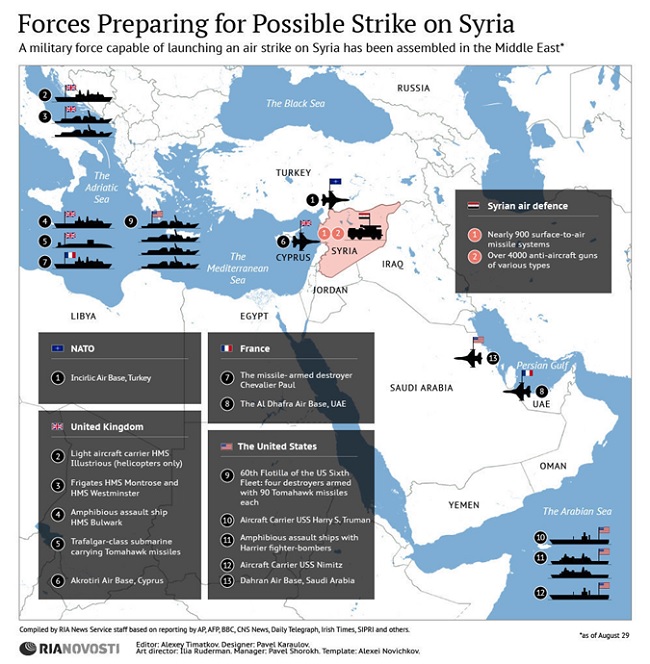Amb. Henry F. Cooper, Chairman . . . Lt. Gen. Daniel Graham, Founder
High Frontier . . Building Truly Effective Defenses . . Reagan’s Vision Lives
E-Mail Message 130910
Beware the Scorpion’s “Tale” . . .
By Ambassador Henry F. Cooper
September 10, 2013
Remember the fable about the frog that gave a scorpion a ride across the river assuming he would be safe because if the scorpion stung him they would both die? But the scorpion stung him anyway, because that was “in his nature.” There’s a bit of an analogy to the dangers of dealing with most of the states of the Middle East.
This is the eve of the 12th anniversary of al-Qaeda’s 9/11 attack on the United States, the first anniversary of al-Qaeda’s attack on our consulate in Benghazi, Libya, and the day that President Obama is scheduled to explain to the nation the reasoning behind his plan to attack Syria to balance the books for Syrian President Bashar al-Assad’s alleged use of chemical weapons. Since the President announced his intent, he sought support from the congress and alleged allies in last week’s G20 meetings in St. Petersburg, Russia—so far with little apparent sympathy for his thinking. Maybe this caution reflects better thinking than that of the hapless frog that was too easily persuaded of his safety in helping a dangerous fellow traveler in need. Let’s review the bidding and see if we can identify a “scorpion.”
A Centerpiece of the Controversy.
Given likely delays while the powers that be try to negotiate the transfer of Syria’s chemical weapons to an international body, congress probably has more time to consider the implications of the administration’s plan for an “unbelievably small” attack on Syria. Among several issues, none is more important than the fact that Al-Qaeda and/or other jihadists are surely involved among the Syrian “rebels”—in spite of contrary assurances last week from Secretary of State John Kerry and Senator John McCain that most of the rebels have moderate “secular” interests. If their judgment of the alleged dominant influence of these “moderates” is wrong, we could have little ability to control the aftermath of an air and missile attack that is promised not to involve U.S. “boots on the ground.” We could simply level the playing field possibly to enable jihadi operatives to end up in charge—not at all clearly preferred to Assad.
Exactly how do our plans differ from our “lead from behind” strategy in Libya that empowered the “moderates” who in turn killed our ambassador and three others in Benghazi? By the way, when do you think we’ll understand what actually happened last September 11th? And how about the rest of the alleged hoped for “Arab Spring?” But I digress.
Notably, Russian President Vladimir Putin has emphasized that he is not persuaded that Assad was behind the use of the chemical weapons of concern—and others, including former U.S. intelligence officials, also have doubts. If they are correct, al-Qaeda and/or other jihadists plausibly could have undertaken the chemical attack to provoke just such an attack to remove Assad to leave Syria open to them.
Without question, as The New York Times reports, “Syria’s top leaders amassed one of the world’s largest stockpiles of chemical weapons with help from the Soviet Union and Iran, as well as Western European suppliers and even a handful of American companies, according to American diplomatic cables and declassified intelligence records.”
An important issue is, however, whether Assad used them or whether someone else did to bring down the current regime in favor of jihadists. So far, these ideas have not displaced the administration’s claims that Assad is the culprit.
Unfinished Debate on Capitol Hill.
Last week, the Senate Foreign Relations Committee passed proposed support for the President’s plan, implicitly accepting the administration’s claims—and the full senate was expected to vote on the bill this week—before Russia’s initiative yesterday, discussed below. Although Speaker of the House John Boehner (R-OH), Majority Leader Eric Cantor (R-VA) and Minority Leader Nancy Pelosi (D-CA) last week announced their support for a similar bill in the House, it has not yet been taken up in committee—and there is much resistance among the House members of both parties—who have returned to Washington with an ear full of warnings from their constituents.
Then there’s the matter of the costs of the President’s plan. During last week’s hearings and before he left for Europe, Secretary Kerry testified other nations that see Assad as a destabilizing force in the region have proposed to cover the costs. “We don’t know what action we [will be] engaged in right now . . . but some of [these presumably Arab states] have said that if the U.S. is prepared to go do the whole thing, the way we’ve done it previously in other places, they’ll carry that cost. That’s how dedicated they are to this.”
This possibility illustrates an irony, given that of the 19 hijackers (all affiliated with al-Qaeda) in the September 11, 2001 attacks, 15 were citizens of Saudi Arabia and the other four were from Egypt, Lebanon and the United Arab Emirates. My discussion last week of the “hobgoblin of little minds” described the difficulties of dealing with the tangled web of families, tribes, states and alliances of the Middle East, including with the cacophony of other states that fuel the proliferation of weapons of mass destruction—all in the context of “the enemy of my enemy is my friend” tactics, at least for the moment.
Maybe the administration’s full court press underway on both sides of Capitol Hill will add clarity to such concerns . . . especially if the skeptics are paying attention to the inconsistencies and unanswered questions—like what comes after the President’s proposed attack? Especially in terms that the folks back home can understand.
Indecision Abroad.
So, how about the clarity added by interactions with the international community—e.g., as indicated during and after last week’s G20 meeting?
U.S. spokesmen said the G20 members were unanimous in saying that there was “strong evidence” that Assad had used chemical weapons as “a crime against humanity;” that “the international community cannot remain idle;” that “a strong response is critical to show that such crimes are unacceptable and that there can be no impunity.” But there was little support to join a coalition actually to attack Syria. Ten (Australia, Britain, Canada, France, Italy, Japan, South Korea, Saudi Arabia, Spain and Turkey) of the 20 joined the U.S. in issuing a joint statement offering moral support—notably Russia and China did not. Germany subsequently signed on.
NATO offered only defensive support to fellow members, notably in deploying Patriot missile defenses in Turkey. Several European Union states also have offered moral support but not troops to attack Syria. So far, only France has suggested that it might join with military operations against Assad—and that offer is in flux. After the G20 meeting, President François Hollande clarified, “We’re now going to wait for the decision by Congress . . . then the [U.N.] inspectors’ report.” And this morning, the French indicated they will be pressing the new diplomatic initiative in the U.N. Security Council.
Hollande no doubt is reflecting pressure in France to seek the widest possible approval at home and abroad before participating in military action. See various press reports—notably last Saturday’s New York Times. Russia and China can be expected to block U.N. efforts to support the President’s plan.
And whatever may have transpired in the President’s private meetings with Mr. Putin, Russia’s President is adamantly against an American-led intervention and has directed Russia’s naval preparations for such an attack to include at least four warships to the Mediterranean Sea—three of which passed through the Bosporus last Thursday. It should not be forgotten that the Syrian port of Tartus is Russia’s only military base outside of the former Soviet Union—assuring that Russia is likely to remain Syria’s friend. The Voice of Russia reported as much when relating Putin’s views on the G20 meeting, including that Russia will back Syria if Syria is attacked.
Apparently in response to an off-hand comment by Secretary Kerry that Syria could divert the crisis by agreeing to turn over his chemical weapons to international control, Russia pressed Syria for such a negotiated settlement. More specifically Russia asked Syria to transfer control of its chemical weapons to international monitors in order to prevent a U.S. military strike and to sign and ratify the Convention on Chemical Weapons. Whether this initiative goes anywhere—and that seems unlikely, it may slow the congressional action.
But if such an agreement were reached, it could reduce the likelihood of a confrontation between U.S. and Russia. While little information is provided about the deployed Russia forces in the region—including those present before several additional Russian ships entered the Mediterranean Sea, consider a view of some U.S. and allied forces in the region . . . see the figure below.
Meanwhile, the size of the U.S. strike force has been reported to be growing, no doubt because the delays have enabled Syria to disperse the potential targets of what Secretary Kerry has called an “unbelievably small” attack. Really? And no doubt unbelievably effective??? And how will this play out in view of the above mentioned new initiative????
Whatever . . . these unbelievably ineptly managed events have projected U.S. weakness, been dangerously provocative and boded ill for future U.S.-Russia relations, as discussed in considerable detail in last Friday’s Investor’s Business Daily article by J. Michael Waller, appropriately titled, “A Resurgent Russia Challenges U.S. as Obama Fails Foreign Policy Test.” The G20 and subsequent events have not helped.
In the Middle East, the administration’s effort to promote the so-called “April Spring” has been a failure wherever it has been tried. And, as noted above, we still haven’t learned what happened in Benghazi, perhaps the most important consequence of the President’s failed efforts to “lead from behind.” So, why do we expect success in Syria?
Imagine how our friends in Israel must view this meandering ad hoc U.S. behavior—while deciding how to protect their interests even if they must go it alone. This is enormously troubling, especially since the same message of U.S. ambivalence is being communicated to Iran, which—in spite of the new allegedly more moderate President Hassan Rouhani—is dedicated to the destruction of Israel and America, according to the true ruling authority, Ayatollah Khomeini. This issue seems much more important than the Syrian issues, given Iran’s steady deliberate march toward nuclear weapons that could be used to attack Israel and/or America.
Home Alone Again . . .
Following the G20 meeting failure, the President and his representatives have tried to pick up the pieces and rally support among allies and at home—even as congress debates and prepares for critically important votes. Reported have been high level meetings with European Union members and phone calls/meetings to congressional members—Republicans and even Democrats who don’t understand the President’s policy or goals and who returned from their summer break with an earful from their constituents who oppose attacking Syria by very large margins.
Last week’s hearings and the lack of international support reinforced this reluctance. Illustrative of the problem was Chairman of the Joint Chiefs Martin Dempsey’s answer to Senator Bob Corker’s query in last week hearings about the goal in Syria: “I can’t answer that, what we’re seeking.”
Perhaps the President will provide this critical information and more clarity in his address to the nation this evening—now within the context of the latest development of his administration’s ad hoc diplomacy.
For a preview of his anticipated remarks before the new initiative, see the text of his Saturday radio address. And yesterday, the Los Angeles Times repeated the earlier report that he is now planning a more extensive attack, than previously indicated—a new approach and still “unbelievably small?” And now the speech writers must be working overtime to explain how the new initiative will undoubtedly lead to kicking the can on congressional decisions about attacking Syria.
To quote Sun Tzu: “Tactics without strategy is the noise before defeat.” Stay tuned . . .
So, About the Scorpion(s) . . .
There are likely to be delays to accommodate these breaking events—possibly indefinite delays. So is there still a “scorpion” that wants to be carried across the river? It seems pretty clear that there is great reluctance to stand with the President on the merits of his case for attacking Syria. And if our military stands alone in carrying out the President’s bidding, it’s pretty clear that America will be like the hapless frog, possibly carrying a host of scorpions, among them:
- Russia, which clearly opposes any attack on Syria and has stationed Russian warships in the Mediterranean along with ours—this posture sets a stage for possible miscalculations with horrific consequences. Major wars have begun because of such miscalculations.
- Al Qaeda and other jihadists who are present in Syria—the only dispute has to do with how potent they are. Whatever the numbers, we can expect linkage with al-Qaeda/jihadists outside of Syria—including within the U.S. On Sunday’s ABC This Week, former FBI Director Robert Mueller said he was most worried about viable terrorists threats from aviation, cyber and weapons of mass destruction threats—worldwide and, as he has said publically before, including from Americans trained as jihadists abroad and who have returned to the U.S. This possibly is a concern with or without an attack on Syria, especially on the anniversary of 9/11.
- Iran, an ally of Russia and Syria (and China and North Korea . . . ) and, along its ally Syria, an enemy of some of the Arab states, which has sworn to destroy Israel, the little Satan, and America, the Great Satan.
- While this episode proceeds, Russia and China build more strategic arms and modernize the ones they have while we allow ours to atrophy—all the while serving the cacophony of proliferation that fuels such conflicts.
Can the new hope provided by Russia’s initiative to get Syria to get rid of its chemical weapons really provide an alternative to having to cross the river? If not how many of these scorpions shall we put on our back while attempting to make it to the other side?
High Frontier Plans.
We at High Frontier will continue to stick to our knitting, by seeking as quickly as we can to inform “the powers that be” of existential threats to the American people—as we have discussed in our emails for many months—and to urge them to “provide for the common defense” as charged by the Constitution they are sworn to uphold. Hopefully, key federal authorities and members of congress will soon begin to deal more effectively with the existential threat posed by natural and manmade electromagnetic pulse.
Key initiatives are to urge the Washington powers that be to undertake both the Shield Act and efforts to enhance our ballistic missile defenses, especially for our citizens on the East Coast and around the Gulf of Mexico, where they are completely vulnerable to ballistic missiles launched from vessels in the Gulf—or from Latin America, e.g., Venezuela.
But frankly, we have come to doubt that Washington will act in an expeditious way. Thus, we are also taking the message to grass roots America. Our local and state authorities need to understand these issues and what they might do if their federal representatives continue to fail “to provide for the common defense.” The end of this month, I will be in the Florida panhandle, seeking to advise the folks there of their absolute vulnerability against ballistic missiles launched from the Gulf of Mexico—and what can be done about it if only their representatives do their jobs.
In particular we will be observing that it would be wise for the Florida state legislature to follow Maine’s initiative and harden the electric power grid in Florida, while holding the Washington authorities accountable for their oath to provide for the common defense. Hopefully, in joining such an effort, other states will be encouraged for follow them.
And what can you do?
Join us at High Frontier in seeking to alert the public and your local and state authorities to the existential threats posed by both man-made and natural EMP events—and what can be done about these threats.
We can use your help in spreading this information to the grass roots and to encourage all “powers that be” to provide for the common defense as they are sworn to do. Will you do your part?
Begin by passing this message to your friends and suggest they visit our webpage, www.highfrontier.org for more information. Also, please encourage your sphere of influence to sign up for our weekly e-newsletter!
Please click here to read Past Weekly Updates!
Please click here to read past Flash Messages!
Please help High Frontier continue this important and timely work!
Be sure to follow us on our Social Sites!
If you found this letter via our Social Sites, and you would like to subscribe, click below!







